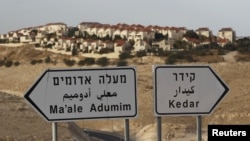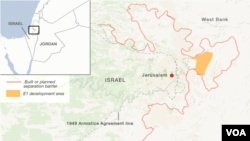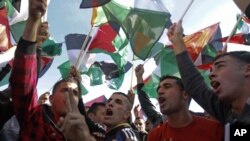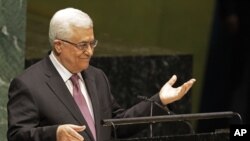JERUSALEM —
The Obama administration has joined European nations in trying to pressure Israel to reverse plans to build thousands of homes in the occupied areas of East Jerusalem and the West Bank, claimed by the Palestinians as part of an independent state.
White House spokesman Jay Carney said Monday that Israeli leaders should "exercise restraint" and "reconsider" the housing plans, announced last week in retaliation for the Palestinian Authority securing an upgrade in its U.N. status to a "non-member observer state." Carney said the "unilateral" Israeli moves are "counterproductive and make it harder to resume direct negotiations to achieve a two-state solution" to the Israeli-Palestinian conflict.
U.S. State Department spokesman Mark Toner criticized Israel's decision to start planning the development of a barren area it calls E-1, near East Jerusalem. Toner said any construction in the zone would be "especially damaging" to peace efforts.
Earlier Monday, five EU nations protested Israel's moves by summoning the Israeli ambassadors in their capitals. The governments of Britain, Denmark, France, Spain and Sweden called for the housing projects to be scrapped.
Israel Stands by Housing Plans
Israeli Prime Minister Benjamin Netanyahu rejected the criticism. His office issued a statement saying "Israel will continue to stand by its vital interests, even in the face of international pressure." It said "there will be no change in the decision that has been made."
E-1 would link East Jerusalem to the main West Bank Jewish settlement of Maaleh Adumim. Israel claims all of Jerusalem as its capital and vows to incorporate major West Bank settlements into its territory in any peace agreement.
U.N. Secretary-General Ban Ki-moon said Sunday that the E-1 project represents an "almost fatal blow" to chances of achieving peace because it "risks completely cutting off" East Jerusalem from the rest of the West Bank.
Implications of the E-1 Project
Palestinians want East Jerusalem as the capital of a future state that incorporates the West Bank. They say E-1's location at the center of the West Bank would make it impossible for them to form a state with viable borders and would block Arab access to East Jerusalem.
Supporters of E-1 say it would not obstruct an independent Palestine's connection to Jerusalem through Arab districts such as Abu Dis. They also say it would not prevent the northern and southern parts of the West Bank from being connected by a corridor at least 15 kilometers wide - about the same as the narrowest width between Israel's Mediterranean coast and the edge of the West Bank.
EU Considers Further Response
Swedish Foreign Minister Car Bildt said Monday that Stockholm will encourage other EU members to pursue additional steps against Israel. He did not elaborate. The 27-nation EU is a major trading partner of Israel.
EU divisions could make it difficult for the bloc to take any concerted action. French President Francois Hollande said he is not ready to impose sanctions on Israel. French and British officials also downplayed the possibility of their governments taking the rare step of recalling their ambassadors from Israel.
France was one of 14 EU nations that voted in favor of upgrading Palestine to an observer state at the U.N. General Assembly last Thursday. Britain was among 12 EU members that abstained, while the Czech Republic voted against. The UNGA overwhelmingly approved the upgrade by a vote of 138 in favor, with 41 abstentions and nine against. The United States also joined Israel in opposition.
Renewed Negotiations Unlikely
West Bank Palestinians gave a warm welcome Sunday to Palestinian Authority President Mahmoud Abbas upon his return from the U.N. General Assembly. They celebrated the world body's first formal adoption of the word "state" alongside their name. But there is little evidence that the U.N. decision is changing the prospects of renewed negotiations between the Israeli government and Palestinian representatives.
Abraham Diskin, an analyst at Israel's Inter-Disciplinary Center, said the U.N. vote was largely symbolic in that it represented change, but did not help the Palestinian cause a great deal. "It increases antagonism," he said. "Probably the only way to achieve some solution is by negotiation. And unilateral moves - either by Israel or the Palestinians - just create animosity and delay what should be done, which is direct negotiations."
Abbas Under Pressure
Palestinian analysts said Abbas was obliged to go to the United Nations to boost his standing among Palestinians. Abbas and his Fatah political faction in the West Bank were largely on the sidelines as rival Hamas militants who control the Gaza Strip engaged in an eight-day conflict with Israel. The cross-border attacks ended with a shaky cease-fire one week before the U.N. vote.
Gaza-based political commentator Talal Okal said that before the conflict, Fatah would have won any election in the Palestinian territories. But now, he said, it would lose. "The very important difference between Fatah and Hamas is that Hamas has its vision, has its program and it's ready to pay for it," Okal said. "They are ready to pay the price. The others [Fatah] are not."
Hamas Takes Center Stage
Political scientist Mkhaimar Abusada of the University of Gaza said the conflict for the first time put Hamas center-stage in the Middle East with visits to Gaza by many foreign ministers from the region and attention by international diplomats negotiating a cease-fire. "Hamas is no longer isolated, or, Hamas is no longer irrelevant as the United States and Western countries have dealt with it," Abusada said. "The policy of isolating, boycotting Hamas hasn't really worked. It's very much the opposite now."
Hamas, which won power in Gaza elections five years ago, is seeking an end to an Israeli trade blockade and a reopening of its land-borders to international trade. But Israel refuses to deal diplomatically with Hamas because the militants do not recognize the Jewish state and have called for its destruction.
It was Egypt, and not Abbas, that was involved in the cease-fire negotiations over Gaza. As a result, analysts said, Abbas appeared to become largely irrelevant. They said this is a major reason for his strong speeches at the United Nations and in Ramallah following the vote.
Abraham Diskin of Israel's Inter-Disciplinary Center said Mr. Abbas is being pressured by Palestinian extremists. "We have now amongst the Palestinians the most moderate leaders ever," he said. "Nevertheless, because of the pressure of extreme movements and fanatics like the jihadist movements, there is double-talk that doesn't promote the [peace] process."
Michael Lipin contributed from Washington.
White House spokesman Jay Carney said Monday that Israeli leaders should "exercise restraint" and "reconsider" the housing plans, announced last week in retaliation for the Palestinian Authority securing an upgrade in its U.N. status to a "non-member observer state." Carney said the "unilateral" Israeli moves are "counterproductive and make it harder to resume direct negotiations to achieve a two-state solution" to the Israeli-Palestinian conflict.
U.S. State Department spokesman Mark Toner criticized Israel's decision to start planning the development of a barren area it calls E-1, near East Jerusalem. Toner said any construction in the zone would be "especially damaging" to peace efforts.
Earlier Monday, five EU nations protested Israel's moves by summoning the Israeli ambassadors in their capitals. The governments of Britain, Denmark, France, Spain and Sweden called for the housing projects to be scrapped.
Israel Stands by Housing Plans
Israeli Prime Minister Benjamin Netanyahu rejected the criticism. His office issued a statement saying "Israel will continue to stand by its vital interests, even in the face of international pressure." It said "there will be no change in the decision that has been made."
E-1 would link East Jerusalem to the main West Bank Jewish settlement of Maaleh Adumim. Israel claims all of Jerusalem as its capital and vows to incorporate major West Bank settlements into its territory in any peace agreement.
U.N. Secretary-General Ban Ki-moon said Sunday that the E-1 project represents an "almost fatal blow" to chances of achieving peace because it "risks completely cutting off" East Jerusalem from the rest of the West Bank.
Implications of the E-1 Project
Palestinians want East Jerusalem as the capital of a future state that incorporates the West Bank. They say E-1's location at the center of the West Bank would make it impossible for them to form a state with viable borders and would block Arab access to East Jerusalem.
Supporters of E-1 say it would not obstruct an independent Palestine's connection to Jerusalem through Arab districts such as Abu Dis. They also say it would not prevent the northern and southern parts of the West Bank from being connected by a corridor at least 15 kilometers wide - about the same as the narrowest width between Israel's Mediterranean coast and the edge of the West Bank.
EU Considers Further Response
Swedish Foreign Minister Car Bildt said Monday that Stockholm will encourage other EU members to pursue additional steps against Israel. He did not elaborate. The 27-nation EU is a major trading partner of Israel.
EU divisions could make it difficult for the bloc to take any concerted action. French President Francois Hollande said he is not ready to impose sanctions on Israel. French and British officials also downplayed the possibility of their governments taking the rare step of recalling their ambassadors from Israel.
France was one of 14 EU nations that voted in favor of upgrading Palestine to an observer state at the U.N. General Assembly last Thursday. Britain was among 12 EU members that abstained, while the Czech Republic voted against. The UNGA overwhelmingly approved the upgrade by a vote of 138 in favor, with 41 abstentions and nine against. The United States also joined Israel in opposition.
Renewed Negotiations Unlikely
West Bank Palestinians gave a warm welcome Sunday to Palestinian Authority President Mahmoud Abbas upon his return from the U.N. General Assembly. They celebrated the world body's first formal adoption of the word "state" alongside their name. But there is little evidence that the U.N. decision is changing the prospects of renewed negotiations between the Israeli government and Palestinian representatives.
Abraham Diskin, an analyst at Israel's Inter-Disciplinary Center, said the U.N. vote was largely symbolic in that it represented change, but did not help the Palestinian cause a great deal. "It increases antagonism," he said. "Probably the only way to achieve some solution is by negotiation. And unilateral moves - either by Israel or the Palestinians - just create animosity and delay what should be done, which is direct negotiations."
Abbas Under Pressure
Palestinian analysts said Abbas was obliged to go to the United Nations to boost his standing among Palestinians. Abbas and his Fatah political faction in the West Bank were largely on the sidelines as rival Hamas militants who control the Gaza Strip engaged in an eight-day conflict with Israel. The cross-border attacks ended with a shaky cease-fire one week before the U.N. vote.
Gaza-based political commentator Talal Okal said that before the conflict, Fatah would have won any election in the Palestinian territories. But now, he said, it would lose. "The very important difference between Fatah and Hamas is that Hamas has its vision, has its program and it's ready to pay for it," Okal said. "They are ready to pay the price. The others [Fatah] are not."
Palestinian UN Statehood Vote
Palestinian UN Statehood Vote
- Palestinians won non-member observer state status
- They previously had non-member observer entity status
- The new status allows Palestinians to participate in General Assembly debates
- State status lets Palestinians apply to join the International Criminal Court and other U.N. agencies
- A Palestinian bid to gain full U.N. membership failed in 2011
Political scientist Mkhaimar Abusada of the University of Gaza said the conflict for the first time put Hamas center-stage in the Middle East with visits to Gaza by many foreign ministers from the region and attention by international diplomats negotiating a cease-fire. "Hamas is no longer isolated, or, Hamas is no longer irrelevant as the United States and Western countries have dealt with it," Abusada said. "The policy of isolating, boycotting Hamas hasn't really worked. It's very much the opposite now."
Hamas, which won power in Gaza elections five years ago, is seeking an end to an Israeli trade blockade and a reopening of its land-borders to international trade. But Israel refuses to deal diplomatically with Hamas because the militants do not recognize the Jewish state and have called for its destruction.
It was Egypt, and not Abbas, that was involved in the cease-fire negotiations over Gaza. As a result, analysts said, Abbas appeared to become largely irrelevant. They said this is a major reason for his strong speeches at the United Nations and in Ramallah following the vote.
Abraham Diskin of Israel's Inter-Disciplinary Center said Mr. Abbas is being pressured by Palestinian extremists. "We have now amongst the Palestinians the most moderate leaders ever," he said. "Nevertheless, because of the pressure of extreme movements and fanatics like the jihadist movements, there is double-talk that doesn't promote the [peace] process."
Michael Lipin contributed from Washington.







